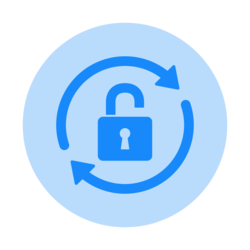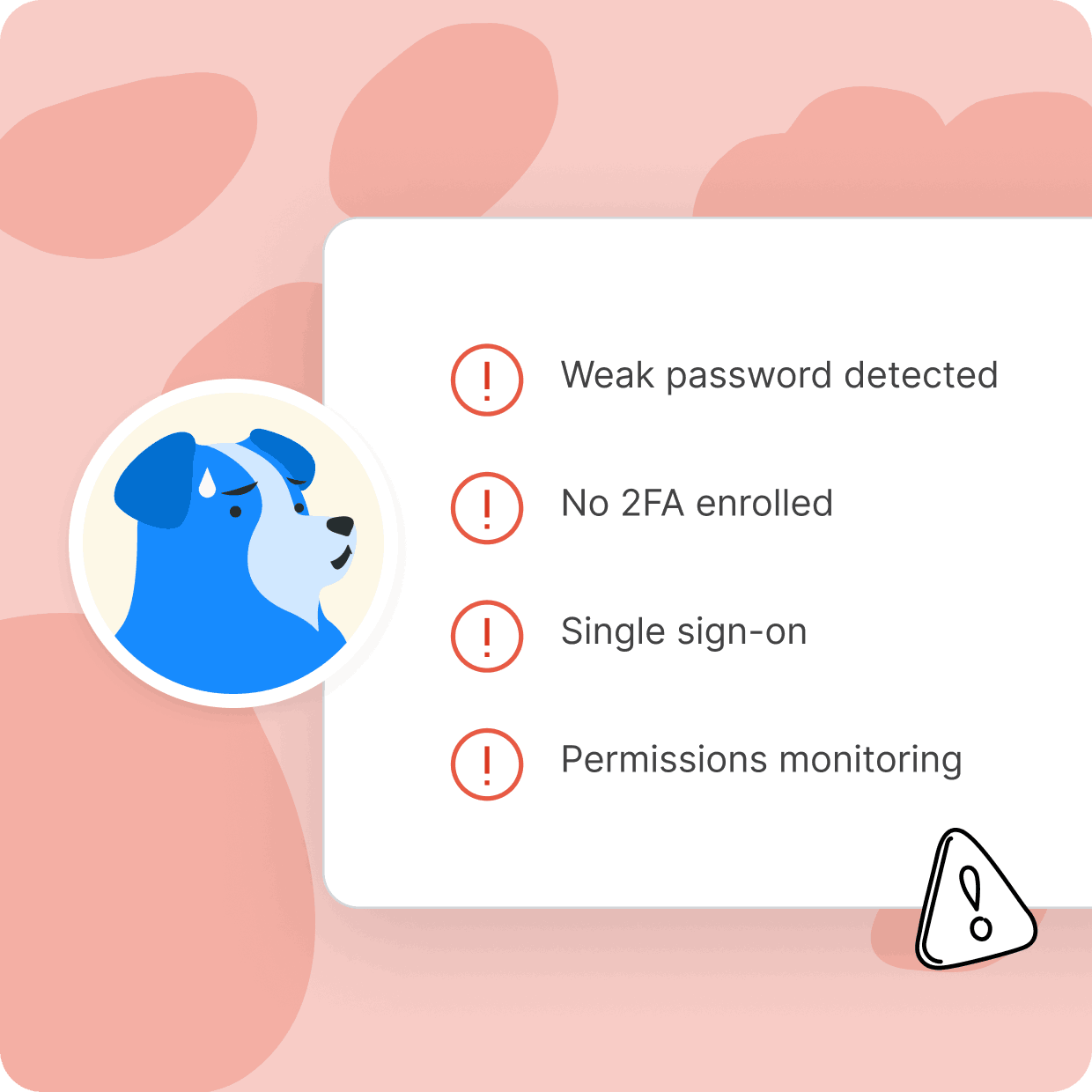SaaS cloud security refers to a software-as-a-service platform that is specifically designed to protect and secure cloud-based applications and data. It offers various security features, such as encryption, access controls, threat detection, and monitoring, to safeguard sensitive information and defend against cyber threats within the SaaS environment.
Unfortunately, many applications don't support identity standards like the Security Assertion Markup Language (SAML) and the System for Cross-domain Identity Management (SCIM) specification. Without native support for these standards, applications either can't work with many PAM solutions or require expensive integrations.
Cerby allows you to manage all your SaaS administrator accounts, rotate credentials, and monitor and audit privileged account activities.
Secure Privileged Accounts
Not all accounts are created equal. Some come with administrative permissions that put sensitive data at risk when in the wrong hands. With Cerby, you can help protect your business from bad actors, mistakes, and data breaches.
With Cerby You Can

Secure your SaaS admin accounts

Protect your business from data breaches

Eliminate the costs of custom integrations
Cyber Security SaaS
With the growth of digital services and among markets in which consumers increasingly rely on digital experiences, cybersecurity has become a fundamental aspect of protecting digital assets. Cyber security SaaS, or Software as a Service, is an innovative solution to protect sensitive information.
This approach involves outsourcing cybersecurity measures to a third-party provider who can maintain and update said measures regularly. As the threats to cybersecurity continues to rise, SaaS cyber security service offers businesses granular control over potential vulnerabilities, real-time protection against cyber-attacks, and on-demand scalability and flexibility.
Cyber security SaaS is often critical in today's digital world to prevent data breaches that can have catastrophic consequences for both individuals and organizations. Naturally, investing in cyber security SaaS solutions is essential to help keep digital assets safe and prevent damage to reputation, loss of data, and legal liabilities caused by cybersecurity breaches.
Cyber Security For Startups
While at one time, smaller organizations may have felt that their smaller size afforded them some safety. In an increasingly digital world, startups and small businesses are vulnerable to cyber threats and data breaches, just like any larger organization. That's why cybersecurity for startups and small businesses is very often critical.
Although some small companies may believe that hackers primarily focus on larger corporations, smaller organizations are increasingly realizing that they too are vulnerable to cyber-attacks. Consequently, it becomes crucial for startups and small businesses to prioritize their cybersecurity strategy.
One of the ways organizations look to address this crucial concern is by using security SaaS solutions. Security SaaS companies offer cloud-based security solutions that can help smaller organizations greatly. Security SaaS can offer a range of benefits to organizations of all sizes: flexibility, scalability, and the on-demand nature of outsourced services. These services can range a lot in capability but are often designed to protect against a whole range of cyber threats. Some common potential security threats include malware, breaches, and phishing attacks.
Security SaaS solutions are often easy for businesses to implement. Organizations will find that a lot of cyber security companies offer customizable options. This can be a great help and can enable different services to meet the specific needs and requirements of different businesses.
With cyber security startup ideas bringing new and more advanced security measures, security SaaS is an often accessible and valuable solution for startups and small businesses who are looking to protect their reputation, their digital assets, and their capacity to continue operations.
Security SaaS solutions can be highly important to businesses. With the right service–one which matches a company’s needs well, businesses can protect their customers' data, build trust with their customers, and avoid the negative impact that a cyber attack or data breach can have on their bottom line.
Cyber Security SaaS Companies
In the modern era of the digital world, ensuring robust cyber security has become a paramount concern for businesses across the board. To address this issue, SaaS companies have emerged, providing cloud-based solutions to protect online assets from malicious attacks. Thankfully, organizations seeking such services will discover a wide array of cyber security SaaS companies, each offering unique features and services tailored to their needs.
Among the top 10 players in the cyber security market, notable companies include AVAST, Norton LifeLock, McAfee, Sophos, and Cisco. These leading cyber security SaaS providers offer a comprehensive range of security solutions, such as antivirus software, anti-malware tools, and firewalls, designed to fortify data against a diverse range of cyber threats.
For small businesses, cyber security SaaS companies like Cloudflare, Nyotron, and Kaspersky provide a comprehensive approach to protecting online assets from cyber attacks. Cyber security companies for small businesses can range quite a bit in their capabilities and offerings but typically share a common goal: protecting their clients from the damage that can be associated with security risks.
Choosing the right cyber security SaaS company can make a huge difference in keeping online assets secure, and businesses should make a wise choice by looking for the companies that offer the best value proposition and features that meet specific needs and requirements.
SaaS Security
With the increasing popularity of cloud-based solutions such as SaaS, businesses that adopt these services in order to protect their valuable digital assets, brand reputation, and operational capacity will need to ensure they incorporate SaaS security best practices, and SaaS security standards and follow SaaS security checklist to enhance their security.
Cyber security SaaS represents an important tool that businesses can use to secure their data and network from cyber threats. It has become an integral part of many modern-day businesses due to its cost-saving, flexibility, and scalability capabilities. However, without proper SaaS security standards and following a SaaS security checklist, the business could be vulnerable to cyber threats.
SaaS security best practices include taking measures like using encryption techniques, employing two-factor authentication, restricting user access, and conducting regular security audits.
According to the Ponemon Institute research, organizations are not able to reduce the cybersecurity risks caused by shared accounts. In the research, 50% of respondents say their organizations’ access management strategy enables employees to share login credentials securely when required by the application.
By leveraging SaaS, businesses may be able to strengthen their security posture and protect their data against a wide range of cyber threats. It's important to keep in mind that the cybersecurity landscape is always changing; businesses must remain vigilant by establishing robust SaaS security practices and keeping up with recent security trends.
Open-source cloud security tools
Open-source cloud security tools like Wazuh, Zeek (formerly Bro), and Snort are great options for businesses that want to keep their security expenses low. On the other hand, businesses may consider opting for the best cloud security tools, such as AlienVault and Tenable, which can provide premium features like threat intelligence and compliance management.
When it comes to SaaS security solutions, many tools like Symantec CloudSOC, Microsoft Cloud App Security, and Cisco Cloudlock offer benefits such as data encryption, access control, and real-time threat detection.
Ultimately, choosing the right cloud security tool comes down to a business's unique security needs and budget. One service may be perfect for one organization but untenable for another. In the end, which service is right for you depends on many factors, not the least of which is your own unique needs. It can be extremely important to weigh the pros and cons of each tool and solution to effectively enhance the overall security of your SaaS applications.
PaaS Security
As services continue to evolve–particularly digital ones, cloud computing has taken technology to a whole new level for many organizations. Cloud solutions have enabled many organizations to accomplish what may have been at one point infeasible. PaaS–or platform as a service, and IaaS–or infrastructure as a service have enabled organizations to outsource often-burdensome tasks and hardware in favor of on-demand cloud-based solutions that can aid them in everything from application development to data management. Though these solutions represent amazing opportunities, PaaS security and IaaS security issues can be important challenges to tackle.
Still, it's still an area that can be quite daunting when it comes to cloud security issues. In the specific case of PaaS and IaaS, several security considerations and best practices need to be followed.
In PaaS Security, best practices include ensuring the security of the operating system, encrypting code and data, limiting access and privileges, managing keys carefully, and having a backup plan.
On the other hand, when it comes to IaaS cyber security, best practices might include having strict access controls, securing the virtual machine, avoiding address disclosure, and regularly assessing infrastructure and applications to avoid potential vulnerabilities.
Compared to SaaS security, PaaS and IaaS security issues can become more prominent as they require users to be more actively involved in ensuring security. With well-defined policies and diligent enforcement of robust security measures, PaaS and IaaS cloud computing solutions can be considered just as safe as on-premise computing.
SaaS security Architecture
The future of cyber security SaaS is promising, with a focus on emerging trends, startups, and market growth. One of the emerging trends in SaaS security architecture is the shift towards adopting a container-based approach, which provides enhanced automation and scalability of security controls.
In addition, businesses are increasingly embracing a threat-centric approach to security, which prioritizes the identification and mitigation of threats in real-time. The adoption of the NIST Cybersecurity Framework continues to grow, with more businesses adopting the SaaS security checklist NIST to improve their security posture.
Market growth may potentially be fueled by the rising number of SaaS providers entering the market as demand for SaaS cybersecurity solutions grows. Some top 10 cyber security startups to watch include Aqua Security, BitSight, Cybereason, Darktrace, Exabeam, Illusive Networks, Lookout, SentinelOne, Snyk, and Tessian.
Many consider these startups to be squarely at the forefront of developing advanced cybersecurity solutions for the SaaS industry–ranging from threat detection and response all the way to compliance management and risk assessment. As the SaaS industry continues to grow, businesses may need to place an increasing focus on cybersecurity SaaS solutions to ensure data protection and maintain customer trust. Working with trusted SaaS cybersecurity partners will very likely be critical to protecting from threats and staying ahead of the curve.
